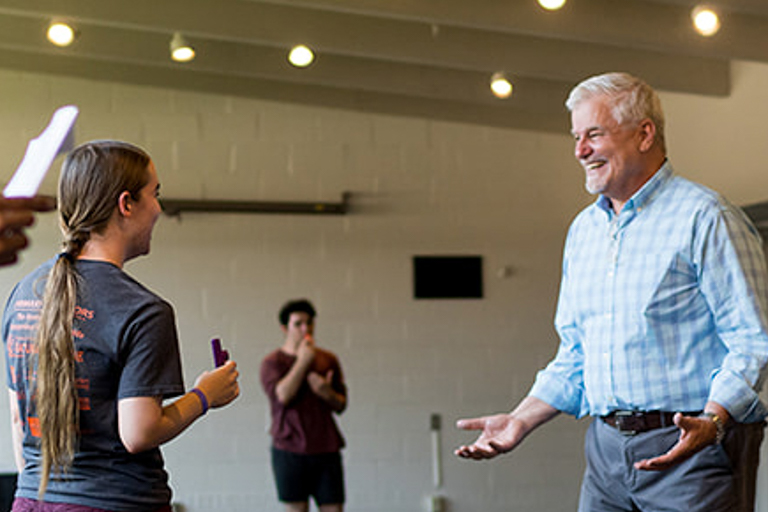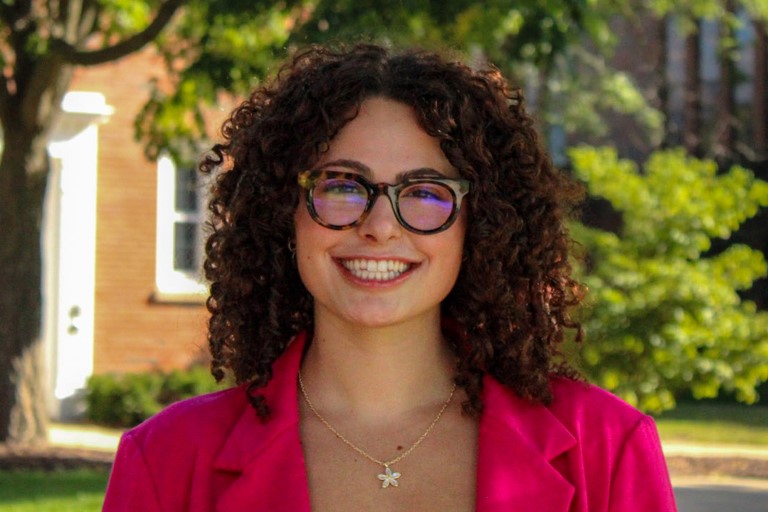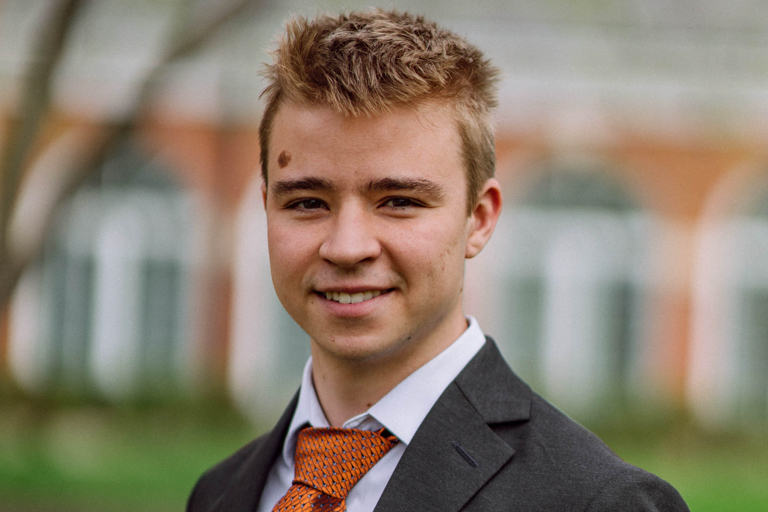Remembering C. William (Bill) Pollard ’60, Ed.D ’18
Words: Melissa Schill Penney ’22
Photos: Courtesy of the Wheaton College Library Archives and Special Collections
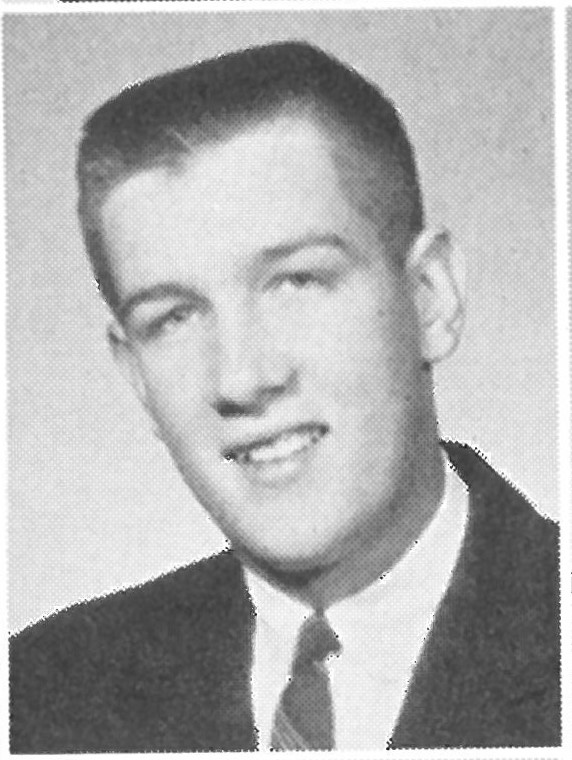
Tower Yearbook photo of Bill Pollard.
1959
Dr. C. William (Bill) Pollard ’60, Ed.D. ’18 walked onto Wheaton College’s campus in 1956 as a student and never truly left, serving as a staff and faculty member, then as a Trustee and Trustee Emeritus. Now, even after his death on June 6, 2025, Pollard’s influence is still felt by the Board of Trustees and college administrators.
Pollard served on the Board of Trustees for 31 years, including two terms as the Chairman of the Board. He and his wife, Judy Wyngarden Pollard ’60, were honored as Alumni of the Year for Distinguished Service to Alma Mater in 1997.
“Wheaton College celebrates the life and mourns the death of Trustee Pollard,” said President Philip Ryken ’88. “Mr. Pollard demonstrated servant leadership and a commitment to Christian integrity. He had a mission-shaping influence.”
Prior to his tenure on the Board of Trustees, Pollard had several encounters with Wheaties that altered his career course and shaped his professional and personal development.
Pollard completed his J.D. at Northwestern University and launched a career in corporate finance and tax law, starting at Wilson & McIlvanie then going on to found his own firm. Then, in his thirties, he landed in the hospital with a bleeding ulcer. President Hudson Taylor Armerding ’41 visited him in the hospital and made what would become a life-changing offer: Would Pollard come work for Wheaton College?
Pollard served as Wheaton College’s Chief Financial and Advancement Officer from 1972–77, while also serving as the College’s attorney. He also intermittently taught classes as an adjunct professor.
Near the end of those five years on staff at the College, Pollard met Ken Hansen ’41 and Ken Wessner ’47, then both members of the Board of Trustees and senior executives at ServiceMaster. They invited Pollard to join the leadership team at ServiceMaster, a Fortune 500 service company with brands in cleaning, restoration, moving, and more. Pollard eventually took on the role of CEO from 1983–93, and again from 1999–2001. Additionally, he served on ServiceMaster’s board from 1993–99 and 2001–03.
Pollard was drawn to ServiceMaster because of its first corporate objective “to honor God in all we do.” Under his leadership, ServiceMaster was a deeply respected organization. Fortune magazine named ServiceMaster the number one service company, and The Wall Street Journal named it a “star of the future.” The Financial Times called ServiceMaster “one of the most respected companies in the world.”
Throughout the 1980s and 90s, two-wage-households became more prominent. As a result, cleaning and landscaping services rose in popularity as people began dedicating more time to their careers rather than upkeeping their homes. Pollard recognized this cultural shift and acted accordingly, expanding ServiceMaster’s consumer service arm through acquisitions including Terminix, TruGreen, and Merry Maids. The company experienced tremendous revenue growth, with returns rising from $234 million to $6.4 billion.
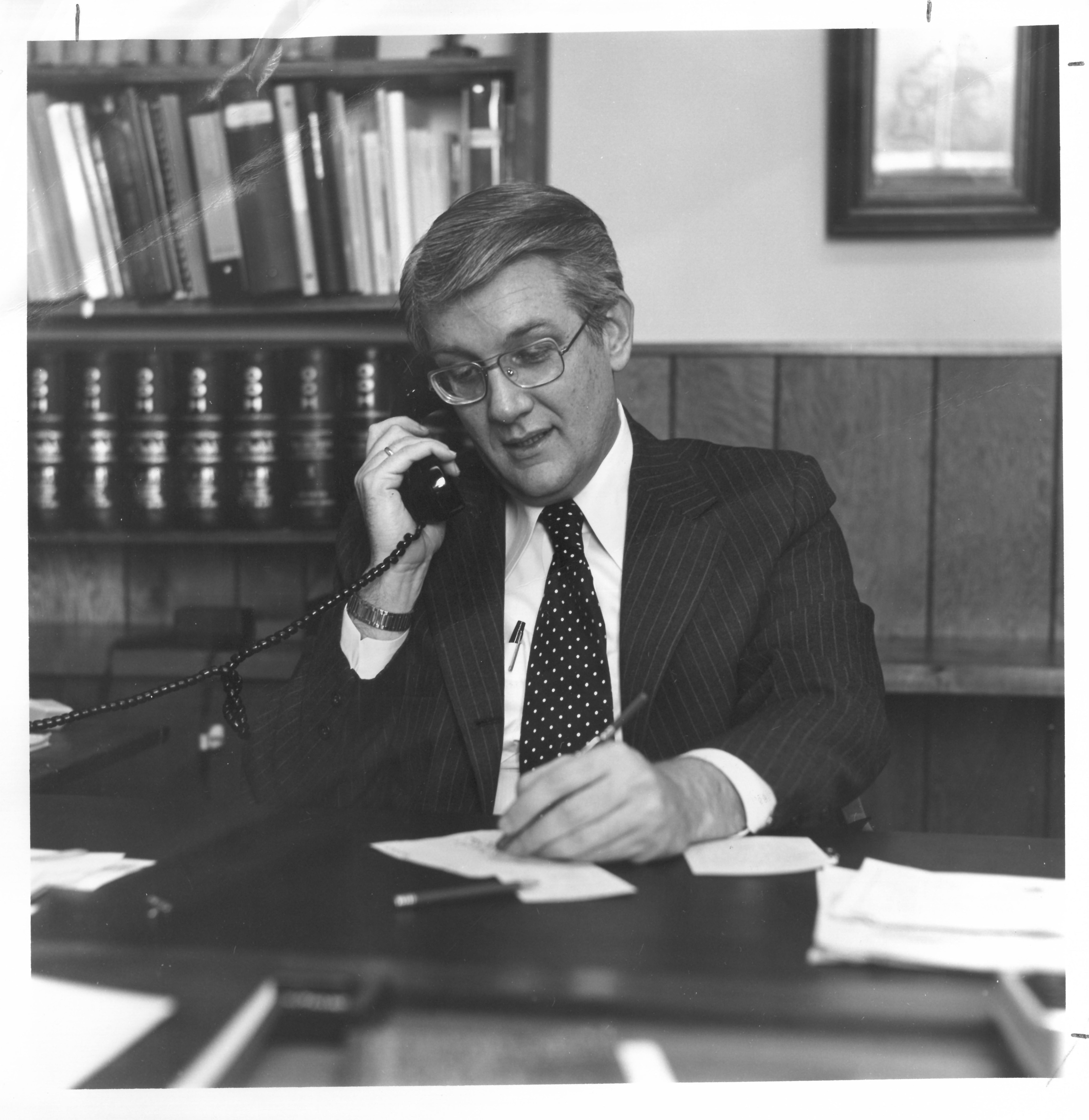
Bill Pollard on the phone, taking notes at his desk.
c. 1975
Pollard carried this aptitude for working with shifts in the cultural climate into his role on the Board of Trustees. “Bill was always a learner of the cultural trends and changes which occurred during his time on the Board of Trustees,” said Gunther (Bud) Knoedler ’51. “He had the unique ability to quickly grasp an issue and react to it. He was never a one-string violin. He was never dominated by a single bias. He was multidimensional, unless it involved his strong faith and Christian position.”
Dr. David K. Gieser ’71 echoed this sentiment. “Bill was prepared to engage deeply on the issues at hand, with an awareness of where we are in time,” he said. “He had the capacity to think broadly and hold multiple perspectives simultaneously. That impacted the Board profoundly.”
Among Board members, Pollard was known for his preparedness. He was studious and analytical, enabling him to engage fully and deeply with the discussion at hand. As a result, his stances were clear and well-informed.
“My sense is that people looked to him for wisdom and for how to get things done when there wasn’t a clear answer,” said Pollard’s son, Dr. Chip Pollard III ’85. “He was not afraid to ask hard questions. He wanted to get to the real issue and talk about what matters. He thought frank discussion helped the board to meet its fiduciary duty to maintain Wheaton’s mission.”
Likewise, Pollard expected others on the Board of Trustees to come to the table with clarity and concision. Gieser remembers working with Pollard on the Board of Trustees in the 1990s. “In the middle of a meeting, I made a statement and Bill asked how I came to that conclusion,” he recounted. “I said, ‘Well, I assumed.’ He interrupted, ‘Never assume!’ That stuck with me, and I learned to speak with data in mind.” He was willing to coach me on the things he championed, and I am so grateful for that.”
This type of clear, informed communication made Pollard a valuable and effective leader, spearheading numerous initiatives during his time on the Board of Trustees.
His background as Wheaton’s chief financial and advancement officer made Pollard particularly attuned to the financial health of the College. He worked tirelessly to ensure that the College was in a stable position for future generations. In one instance, a mine was bequeathed to the College, and Pollard helped sell it, using the interest to build out the College’s endowment.
His financial acumen also benefitted Wheaton’s scholarship programs. Pollard valued Wheaton’s rigorous, Christ-centered liberal arts education, and desired to make it affordable and accessible to as many students as possible, advocating for the continual expansion of scholarship programs. He was also an avid donor and supporter of Wheaton’s Center for Faith, Politics, and Economics, serving on the board and as chair until shortly before his passing.
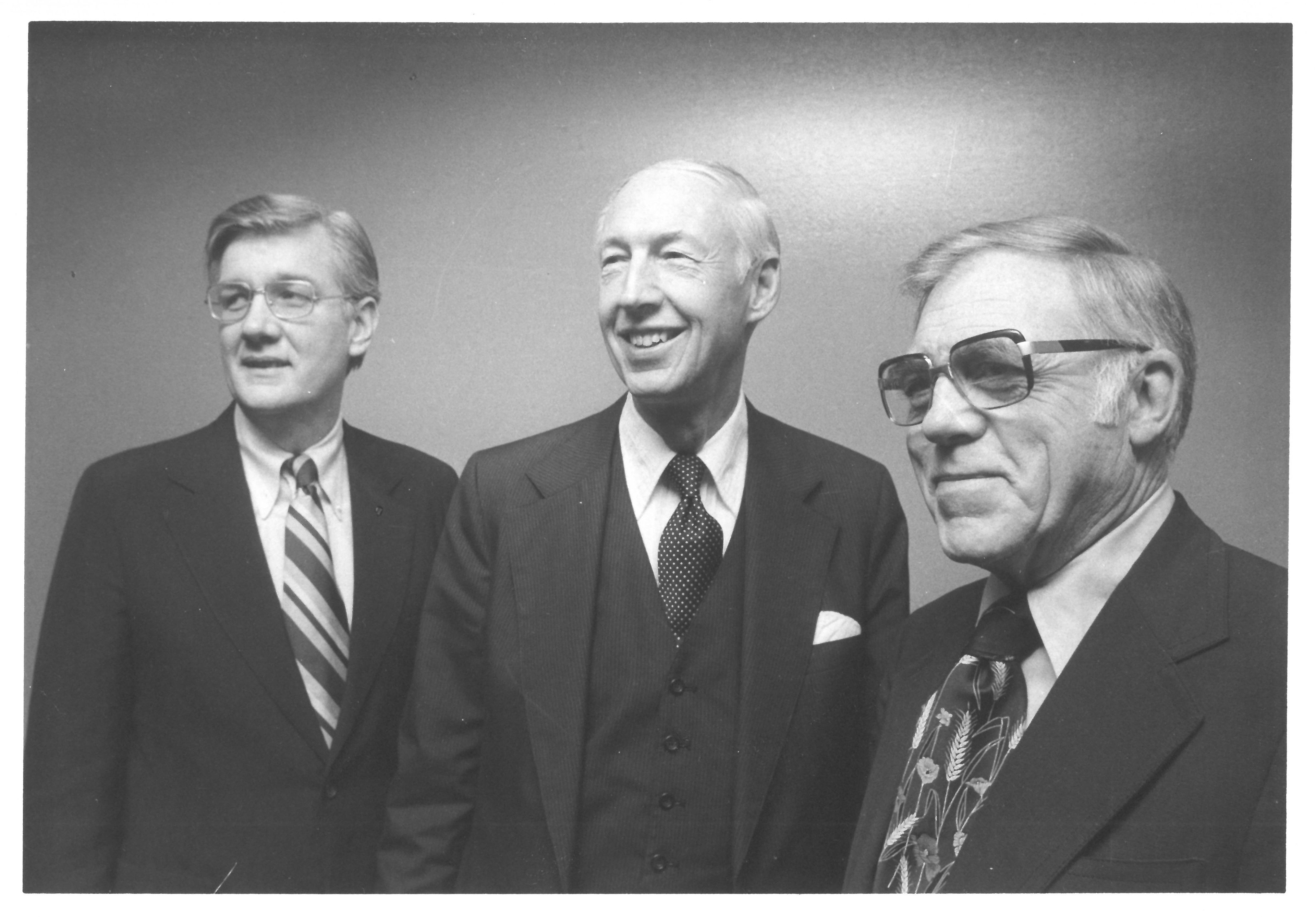
From left to right: Board of Trustees members Bill Pollard, Hudson Armerding, and D. Nelson.
1978
Pollard was also intimately involved in the expansion of Wheaton’s campus, namely the development of the Billy Graham Hall. At the time of its construction, Pollard was serving on both Wheaton College’s Board of Trustees and the Billy Graham Evangelistic Association Board. He served as a liaison during the project, helping make clarifications and commitments as needed.
Above all, Pollard’s leadership was motivated by Wheaton’s mission.
“Wheaton shaped my dad so much as a student, as an employee, and through the people he met there,” said Chip Pollard. “It was a great privilege for him to contribute to Wheaton and serve the administrators, faculty, staff, and students who carried out the mission on a day-to-day basis,” Pollard said. “God used people at Wheaton to shape his life, and he was deeply grateful for the chance to give back by serving as an administrator and trustee.”
The most life-changing relationship Pollard made during his years as an undergraduate at Wheaton was with his wife, Judy. They spent 66 years in marriage together.
“Judy is very special,” Knoedler said. “She was an extremely supportive wife to Bill, and I know through the years she gave significant, loving insights to Bill. We are so grateful to her generous help and service through the years.”
In addition to his commitments to his family and Wheaton College, Pollard was active on numerous other boards, including Central DuPage Hospital, the Drucker Institute, and Herman Miller. He also authored four books, The Soul of the Firm, Serving Two Masters?, The Heart of the Business Ethic, and The Tides of Life.
“I had the privilege of working with Bill when I was a banker and, later, as a college administrator. His grasp of details, quick mind, and standards of integrity were evident in every meeting,” said Dr. Kirk Farney M.A. ’98, Vice President for Advancement, Vocation, and Alumni Engagement. “But what stuck with me the most was his faithful witness for Christ in whatever setting, and his unwavering dedication to the mission of his alma mater.”
Pollard is survived by Judy, their four children and spouses (Julie and Chris Grant, Chip and Carey Pollard, Brian and Becky Pollard, and Amy and Mark Burdett), 14 grandchildren and 26 great-grandchildren. He was preceded in death by his parents, two sisters, and his grandson.

